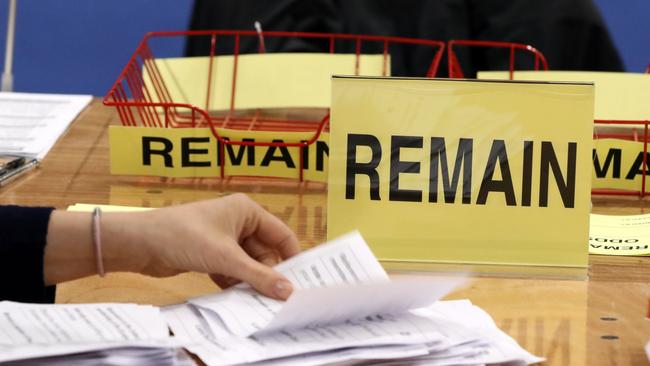Brexit: how the result will affect Australia
BRITAIN’S shock decision to break away from the European Union will have far-reaching impacts on the Australian way of life.

BRITAIN’S shock referendum decision to quit the European Union has unleashed a wave of global jitters which will immediately influence the outcome of our July 2 election.
Markets of all sorts — stocks, futures, oil, butter — want certainty, and the Brits have removed that by a tiny majority of votes.
Britain is only a minor player in our trade as we concentrate on the Asia-Pacific region and giants such as China, Japan, South Korea and India.
But the flow-on effect of its withdrawal from the EU, and the wait while it renegotiates its trade agreements with Europe, will be felt everywhere. As one Australian economist put it today, this could be a further headwind to growth.
Our dollar could fall in value and investment will be slow.
The unsettled conditions are not of his making, but they could favour Malcolm Turnbull over Bill Shorten in the election.
The uncertainty which will follow the Brexit victory will heighten an examination of the economic credentials of the Prime Minister and his team, and the Labor front bench under Mr Shorten — just as Labor is set to release its election promises costings.
This will underline Labor’s strategy of increased spending and prolonged deficits.
Shadow treasurer Chris Bowen has begun reminding voters of how the Labor government of Kevin Rudd and Wayne Swan responded to the global financial crisis of 2008-09, and that Australia emerged from it one of the few industrialised nations not to go into recession.
Labor can indeed be proud of that record, even though some stimulus spending measures remain controversial.
However, the Brexit vote means a Shorten government might not have the money to spend on protecting the Australian economy, or to devote to health and education as it promised. Labor could have to recast its economic strategy.
Mr Turnbull’s company tax cuts might be portrayed as the necessary stimulus to keen businesses going and arriving. The British decision will be declared in some quarters a break for freedom and sovereignty.
It is nothing so grand or benign. It will reinforce a political sentiment for isolationism which has found champions ranging from Donald Trump to Pauline Hanson.
Even China wants to engage with the rest of the world, while Britain now wants to retreat from it, as if the English Channel were a couple of million kilometres wide.
There will be political instability alongside the economic adjustments. Prime Minister David Cameron lost, and the Tory colleagues with whom he disagreed on Brexit won’t let him off lightly.
Conservative Boris Johnson and UKIP’s Nigel Farage — both aligned with the Trump isolationist axis — will have an elevated role in the nation.
The political unrest could mean Britain will not play its usual leadership part in issues important to Australia, such as fighting ISIS in Syria.



